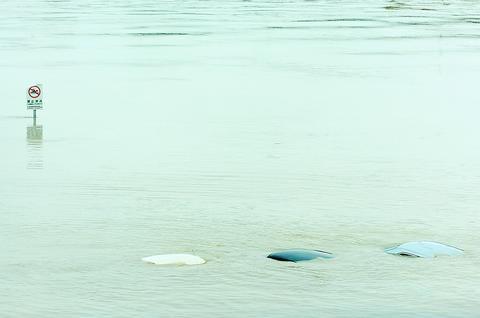Powerful downpours and strong winds lashed the nation yesterday, flooding urban centers in the north and threatening to cause landslides in central mountainous areas, even as the Central Weather Bureau issued a new typhoon warning.
The deluge, the heaviest since Typhoon Nari three years ago, claimed one life and left hundreds stranded at press time yesterday.

PHOTO: SEAN CHAO, TAIPEI TIMES
Houses in Nangang District in Taipei and adjacent Hsichih in Taipei County were swallowed up by muddy water. Sanchung in Taipei County was again hard hit by flooding. People waded across roads in chest-high water in front of their shops and low-rise apartments. Cars plowed through streets in a desperate effort to reach higher ground.
Nangang was drenched with 787mm of rain within 12 hours, with that figure expected to increase today, the Central Weather Bureau said.
Taoyuan and Keelung also saw more than 400mm of rain yesterday. The bureau had issued a torrential rain and strong wind warning on Friday, advising residents in mountainous and low-lying areas to evacuate to escape possible mudslides and flooding.
The National Disaster Prevention and Relief Center said that more than 200 people are sheltering in five shelter stations. In Hsinchu County's Wufeng Township, which is still reeling from a landslide tragedy during Typhoon Aere last month, 85 people from the indigenous Maopu community were evacuated to Wufeng Elementary School. Forty-seven villagers in Ta'ai village were also relocated to Wufeng's health bureau for their safety.
A total of 377,594 households suffered power losses yesterday. Electricity has been restored to almost all of them, the National Disaster Prevention and Relief Center said.
Trains between Taipei, Keelung and Toucheng in Ilan County were canceled yesterday. Airports in Pingtung City and Hengchun were also closed yesterday, as were airports at Chimei and Wangan in Penghu County.
To ease flooding in Taipei City, Premier Yu Shyi-kun yesterday morning ordered the Water Res-ources Agency to open the Yuanshanzai flood-diversion sluice ahead of schedule to ease the burden placed on the Keelung River. The level of the river had reached an alarming height downstream because of the incessant rain on Friday night. Since then, the level of the river has fallen slightly.
The weekend-long downpour may change into sporadic but strong showers in the north, though the unstable weather system could still dump rain on central and southern Taiwan, the Central Weather Bureau said.
With Typhoon Haima and a tropical depression hovering nearby, and Typhoon Songda's airstreams lingering, another wave of torrential rain could hit anywhere in the country early next week, said Wu Te-jung (吳德榮), vice director of the bureau's forecast center.
"From Monday, the rain across the island will slowly subside into regional showers. But the process will only be gradual, depending on how the high-pressure system in the Western Pacific develops in the next few days," Wu told the Taipei Times.
"But sudden showers could still trigger flash mudslides and flooding. The whole island will be on a heavy rain alert in the next few days. Everyone should brace for further activity," he said.

MAKING WAVES: China’s maritime militia could become a nontraditional threat in war, clogging up shipping lanes to prevent US or Japanese intervention, a report said About 1,900 Chinese ships flying flags of convenience and fishing vessels that participated in China’s military exercises around Taiwan last month and in January have been listed for monitoring, Coast Guard Administration (CGA) Deputy Director-General Hsieh Ching-chin (謝慶欽) said yesterday. Following amendments to the Commercial Port Act (商港法) and the Law of Ships (船舶法) last month, the CGA can designate possible berthing areas or deny ports of call for vessels suspected of loitering around areas where undersea cables can be accessed, Oceans Affairs Council Minister Kuan Bi-ling (管碧玲) said. The list of suspected ships, originally 300, had risen to about 1,900 as

Right-wing political scientist Laura Fernandez on Sunday won Costa Rica’s presidential election by a landslide, after promising to crack down on rising violence linked to the cocaine trade. Fernandez’s nearest rival, economist Alvaro Ramos, conceded defeat as results showed the ruling party far exceeding the threshold of 40 percent needed to avoid a runoff. With 94 percent of polling stations counted, the political heir of outgoing Costa Rican President Rodrigo Chaves had captured 48.3 percent of the vote compared with Ramos’ 33.4 percent, the Supreme Electoral Tribunal said. As soon as the first results were announced, members of Fernandez’s Sovereign People’s Party

MORE RESPONSIBILITY: Draftees would be expected to fight alongside professional soldiers, likely requiring the transformation of some training brigades into combat units The armed forces are to start incorporating new conscripts into combined arms brigades this year to enhance combat readiness, the Executive Yuan’s latest policy report said. The new policy would affect Taiwanese men entering the military for their compulsory service, which was extended to one year under reforms by then-president Tsai Ing-wen (蔡英文) in 2022. The conscripts would be trained to operate machine guns, uncrewed aerial vehicles, anti-tank guided missile launchers and Stinger air defense systems, the report said, adding that the basic training would be lengthened to eight weeks. After basic training, conscripts would be sorted into infantry battalions that would take

GROWING AMBITIONS: The scale and tempo of the operations show that the Strait has become the core theater for China to expand its security interests, the report said Chinese military aircraft incursions around Taiwan have surged nearly 15-fold over the past five years, according to a report released yesterday by the Democratic Progressive Party’s (DPP) Department of China Affairs. Sorties in the Taiwan Strait were previously irregular, totaling 380 in 2020, but have since evolved into routine operations, the report showed. “This demonstrates that the Taiwan Strait has become both the starting point and testing ground for Beijing’s expansionist ambitions,” it said. Driven by military expansionism, China is systematically pursuing actions aimed at altering the regional “status quo,” the department said, adding that Taiwan represents the most critical link in China’s